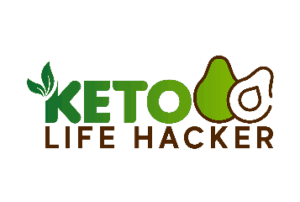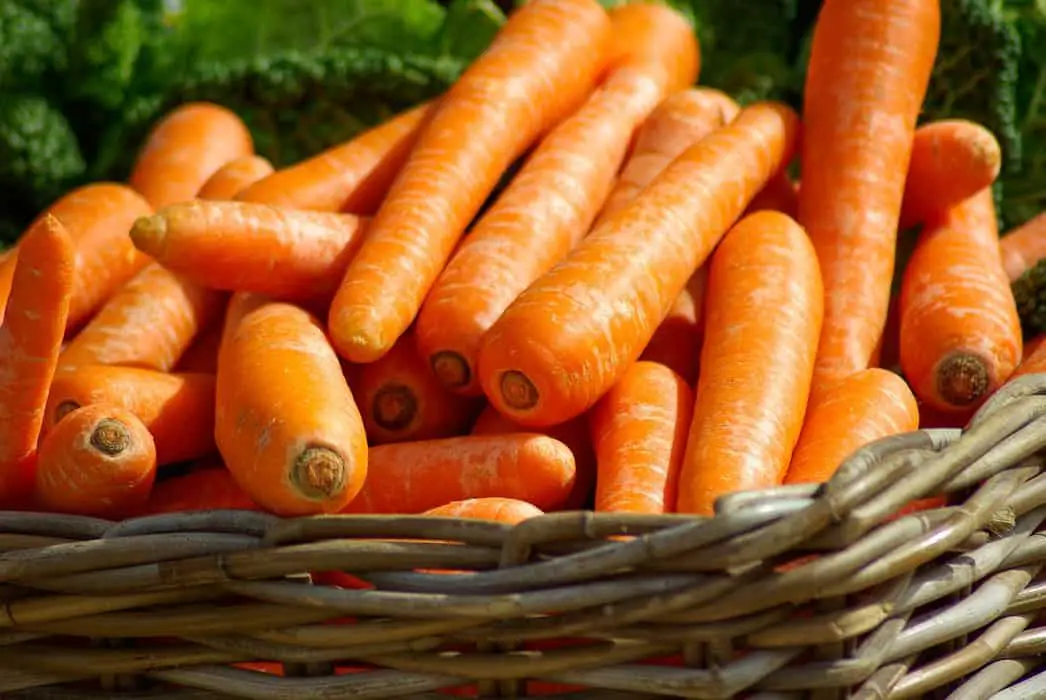Vegetables are probably one of the trickiest foods to pin down when it comes to following a healthy keto diet.
Generally most diets are very accepting of all types of vegetables because they’re low in calories and high in fiber, but some still don’t quite make the cut when it comes to natural sugars and total carb counts.
In this article, I’ll be doing a deep dive of the nutrition background of carrots, and will explain just how keto-friendly they actually are.
Nutrition Breakdown of Carrots
According to the USDA, the nutrition facts for a single serving of carrots are as follows:
- 25 total calories
- 0.1 grams of total fat
- 0.1 grams of polyunsaturated fat
- 6 grams of total carbohydrates
- 1.7 grams of fiber
- 2.9 grams of sugar
- 0 milligrams of cholesterol
- 42 milligrams of sodium (1% of the recommended daily amount)
- 195 milligrams of potassium (5% of the recommended daily amount)
- Vitamin A – 203% of the recommended daily amount
- Calcium – 2% of the recommended daily amount
- Vitamin C – 6% of the recommended daily amount
- Vitamin B-6 – 5% of the recommended daily amount
- Magnesium – 1% of the recommended daily amount
Carrots are also considered to be a healthy source of vitamin K1, also known as phylloquinone, which promotes bone health and is good for blood coagulation.
Benefits of Carrots
-
Improved vision
Carrots have been linked to improved vision and overall improved eye health in a number of ways.
One particularly annoying condition know as night blindness if often brought on by a lack of vitamin A, of which carrots are jam packed.
While night blindness is associated with a lack of vitamin A, it’s important to remember that carrots won’t magically help you see better in the dark, which is a myth that’s been long debunked.
Additionally, getting healthy amounts of beta carotene and vitamin A is good for the longevity of your eyes, and can delay the onset of conditions like glaucoma and macular degeneration.
-
Improved blood pressure
Carrots have been proven to be beneficial when it comes to improving one’s blood pressure because of their high counts of both fiber and potassium.
As I mentioned above, generally half a cup of chopped carrots will yield around 1.8 grams of fiber, and 205 milligrams of potassium, which is a significant portion of your daily amount.
Potassium is a vital electrolyte for the keto diet, and has been proven to help fight against increased rates of high blood pressure and heart disease. Fiber also has these qualities, while also helping to manage blood glucose levels to ward off other heart related conditions such as type 2 diabetes.
-
Help with controlling diabetes
Fiber is able to help with managing and even preventing the onset of type 2 diabetes because of how it is processed by the body comparatively to sugar.
When we eat sugar, our body will instantly absorb it into the blood stream, which can spike our blood glucose levels and require insulin production. This is bad for both keto dieters as it can knock you out of ketosis, and for anyone really because spikes and dips in blood sugar are unhealthy in the long term.
However when we eat foods rich in fiber, it slows down this absorption of sugars coming from other foods in our diet, and helps to stabilize these blood glucose levels.
Furthermore, the glycemic index of carrots is only 39, so it has a low natural effect on blood sugar overall.
-
Helps to protect your skin from the sun
It may come as a surprise, but carrots can actually help to protect your skin from the sun’s harmful ultraviolet rays.
Like sweet potatoes, cantaloupe, and other types of fruits that are high in beta-carotene, carrots are able to reduce the intensity of sunburn and generally help bolster your body’s defense against UV rays.
While there will never be a dietary defense better than putting on topical creams like sun lotion and sunscreen, carrots can help be a secondary line of defense for those with fair skin when spending a lot of time in direct sunlight.
-
Great source of antioxidants
Lastly, carrots are an excellent source of antioxidants, which have been proven to help prevent the development of certain cancers and ward off the effects of accelerated aging from degenerative diseases of both the body and mind.
Antioxidants are able to reduce free radicals within the body, which directly impacts the rate of growth among cancer cells. Specific studies have also found a potential connection between diets rich in carotenoids (which come from carrots) and a lowered risk in prostate cancer. More research still needs to be done, but there’s ample evidence around the benefits of antioxidants on preventing general types of cancer cell growth.
Are Carrots Keto-Friendly?
While carrots are very low in calories, have high amounts of dietary fiber, and have proven benefits to help manage blood sugar levels, unfortunately they are still not entirely keto-friendly. Carrots can be eaten sparingly, but they are still a significant source of natural sugar, and can contribute to driving up your overall net carb counts for any given meal that includes them.
This goes the same for baby carrots and other carrot variants. They are find in very small amounts, but in most traditional meals that utilize carrots, you’re much better off going with a vegetable alternative in order to have a keto-friendly meal.
So what are some good keto-friendly alternatives to carrots?
I’ve included some of my favorite recipes below, featuring low carb veggies like squash, celery, daikon radishes, and turnips.
Keto-Friendly Alternative Recipes to Carrots
-
Low Carb Southern Squash Casserole
Ingredients:
-
- 6 cups of diced yellow squash
- Half a cup of diced onion
- ¼ teaspoon of ground nutmeg
- ¼ cup of grated parmesan cheese
- 3 whole eggs
- 4 tablespoons of grass fed butter or ghee
- One teaspoon of pink Himalayan sea salt
- ½ teaspoon of black pepper
- One cup of heavy whipping cream
- ¼ teaspoon of cayenne pepper
Instructions:
-
- Preheat your oven to 350 degrees F
- In a large skillet, melt down your butter or ghee on medium heat until the pan is hot
- Add in the onion and squash, and saute the two together until they are tender
- Spread the squash and onion mix evenly across the bottom of a 9”x 13” glass dish
- In a large mixing bowl, combine the rest of the ingredients listed above expect for the for the grated parmesan cheese, and mix well to combine
- Pour the entire mixture from the mixing bowl directly over the squash and onion saute
- Top the entire mixture in the glass dish the grated Parmesan cheese
- Bake everything for roughly 45 minutes in the oven until the cheese is browned and the casserole has had time to fully set.
- Let the casserole cool by sitting out for around 10 to 15 minutes.
- Serve either warm or at room temperature, with sides of your choice such as avocado or sour cream
-
Low Carb Stuffed Celery
Ingredients:
-
- 5 whole celery sticks
- 8 ounces of cream cheese, softened
- Half a cup of green olives, sliced
- One tablespoon of cayenne pepper (or sub chili powder)
- Ground peppercorn
- Sprinkle of pink Himalayan salt
Instructions:
-
- In a medium mixing bowl, stir together the softened cream cheese, along with the olives, salt, and pepper
- Prepare the celery by cutting the sticks in half
- Fill the celery sticks with the cream cheese mixture, and top with cayenne pepper or chili powder as desired
-
Keto Roasted Turnips
Ingredients:
-
- 4 medium turnips
- One and a half teaspoons of paprika
- One teaspoon of sea salt
- 2 teaspoons of minced parsley
- One teaspoon of cracked pepper
- 2 teaspoons of avocado oil
Instructions:
-
- Preheat an air fryer to 390 degrees
- Peel and dice the four turnips and place them into a medium sized mixing bowl
- Add in the paprika, pepper, sea salt, and avocado oil to the bowl, and toss the mixture to fully coat
- Spread the turnips in an even layer in your air fryer basket
- Air fry the turnips for about ten minutes, shaking the basket at least once when they have half completed cooking
- Sprinkle with parsley before serving hot
-
Keto Daikon Radish Gravy Fries
Ingredients:
Fries:
-
- 2 whole daikon radishes, peeled and sliced into one half by 3 inch fries
- A pinch of salt and pepper
- One tablespoon of extra virgin olive oil
Gravy:
-
- Half a cup of onion, roughly chopped
- 2 cups of beef broth
- 2 large egg yolks, beaten quickly
- 1/4 cup of unsalted butter or ghee
- 1/4 teaspoon of xanthan gum
Instructions:
Fries:
-
- Peel the daikon radishes, and slice them into half an inch by three inch fries
- Add these sliced fries to a medium mixing bowl, and cover them with water
- Let the daikon radishes soak for ten minutes in order to effectively remove their starch
- Drain the water through a colander, and place the daikon fries over paper towels to dry
- Add the fries to another medium sized bowl along with the olive oil, toss until the fries are thoroughly covered
- Add oiled daikon radishes to a baking sheet, and bake at 40 degrees Fahrenheit for roughly 50 minutes
- Be sure to flip half way through baking for even coverage
- Salt your fries as desired, or serve with keto-friendly ketchup
Gravy:
-
- Add the beef broth to a medium sized saucepan, and let it simmer over low heat for about ten minutes to create a reduction
- Add the onion and the broth together into a high powered blender or food processor and blend together for one minute
- Remove about a third cup of the broth from the pan, and quickly whisk in the egg yolk
- Whisk this mixture of egg yolk and beef broth back into the saucepan, and stir until the gravy starts to thicken
- Add in xanthan gum to the pan, and whisk into the mixture. Cook until it is fully thickened
- Stir in your butter or ghee and mix well
- Serve over your daikon radish fries
Final Thoughts
As you can see, when it comes to vegetables, carrots aren’t really ideal for sticking with a ketogenic diet. They are a good source of fiber, and can definitely be used in small amounts for certain recipes, but they just aren’t worth the risk in my opnion.
Fortunately there’s more veggie options that even the ones I’ve listed above. There are quite a few ways to hack your way into a healthy, tasty keto meal, and the recipes above are just the start.
Do you have any favorite carrot substitutes for keto? Drop a comment below!

